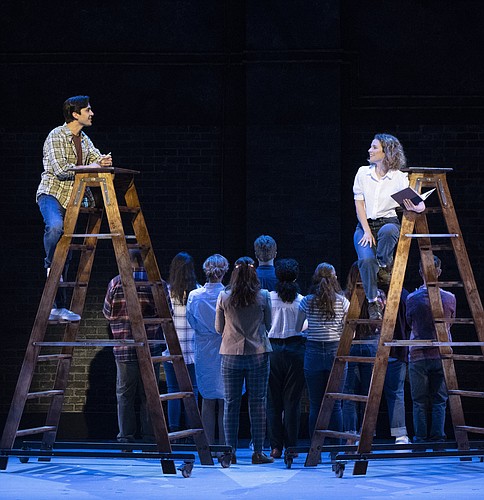- May 9, 2025
-
-
Loading

Loading

Thornton Wilder’s “Our Town” is now on stage — in the second Asolo Rep production to unfold on an indoor stage since March 2020. So what’s the play about? Good question. If you’d asked me before I saw this show, I’d have given you a bad answer.
I’d read (or skimmed) “Our Town” in high school and watched snippets of Sam Wood’s 1940 movie adaptation. Decades later, I had a vague impression of Wilder’s Pulitzer Prize-winning play.
It’s a cornball play about small-town America at the dawn of the 20th century. Its claim to fame is the lack of sets. It’s all just ladders and stuff. That was my fuzzy notion. This production focused it to crystal clarity.
Wilder’s play is surprisingly mystical. You can see the influence of transcendentalism and Buddhist notions of cyclic existence. The wheel of life turns. Breakfast, lunch, dinner. Blue skies, rain. Sunshine, stars. Birth, life, death. So it goes.
The playwright eyes the big picture through a small lens. The play’s stuffed with quotidian minutiae.
Wilder famously takes minimalism to the max with “Our Town.”
No sets, except for a few ladders and whatnot. As a result, the actors mime most of the action. You have to imagine the soda fountains, cows and baseball diamonds. It makes daily life seem like a kind of dance. And a beautiful dance, at that.
Wilder’s original play was a WASP nest. Grover’s Corner, NH, had plenty of churches but no synagogues, ashrams or mosques.
The womenfolk did all the housework; the men had all the paying jobs. Director Desdemona Chiang mixes that up with a rainbow of genders and ethnic origins.
The “Stage Manager” character (Kenn E. Head) functions as the play’s folksy omniscient narrator. Head plays him as detached and bemused. This entity cares about the townsfolk’s lives, but he’s living on a higher plane. George Gibbs (Alex Benito Rodriguez) is an all-American boy who’s great at baseball and lousy at math. As a young teen, he gets his neighbor Emily (Caroline Mixon) to help him with his algebra homework. Rodriguez’s George is head over heels for his neighbor.
Mixon’s Emily is intellectual and politely reserved, but you can tell she’s feels the same way. The study partners gradually become romantic partners. They ultimately marry and stay in town. (George gives up his dreams of baseball and college in the process.)
Greg Watanabe and Summer Dawn Wallace play George’s parents, Dr. Gibbs and Mrs. Gibbs. He heals people; she tends to the homefront; their ambitions end there.
Gregg Weiner and Diana Coates play Emily’s parents, Mr. and Mrs. Webb. He runs the town newspaper and tells everyone what to do in his editorials. But he has no marriage advice for his daughter or future son-in-law at all. Mrs. Webb is warm-hearted — and equally void of marriage counsel. Simon Stimson (Garrick Sigl) is the local choir director. Some unspecified “troubles” have turned him in to a cynical alcoholic. (The town responds by not noticing it.) Sigl plays him at the intersection of comic and tragic.
Diverse casting makes these characters accessible. That’s the director’s choice. And it’s not arbitrary. Diversity is true to the spirit of the play, not a PC distortion of Wilder’s intent. “Our Town” was universal to begin with.
Others on the Asolo Rep’s creative team contribute to the sense of universality. Costume designer Christine Tschirgi dresses the characters in jeans and other contemporary clothes. Matthew Parker’s sound design fills your ears with mooing cows, crowing roosters, and long, lonesome train whistles. The world you see on stage may be minimal. The world in your ears is richly textured.
Xavier Pierce’s lighting contributes to the otherworldly vibe. It’s the illumination of dreams and memory, not the real world. Sara Ryung Clement’s beautifully sparse set design may seem like a no-brainer. But less is not just more. It’s harder.
It all adds up to a lack of specificity. “Our Town” could be Anytown. Or your hometown. You project yourself into it. And the play’s characters start to feel like your family, friends and neighbors.
That’s a nice warm feeling. For the first two acts, the play’s tone is as homespun and upbeat as a Norman Rockwell painting or a Frank Capra movie. And it’s all moving toward a happy ending, right?
Wrong. Sorry.
“Our Town” ends with a tragedy. Simply put, somebody dies. (In case you’re one of the five people in these U.S. who never read this play in high school, I won’t name names.) But dry your eyes. In Wilder’s world, death is just another cycle on the cosmic wheel. And no big deal. The real tragedy is living life without paying attention.
At the end of the third act, a new ghost poses a question to the Stage Manager.
“Do any human beings ever realize life while they live it … every, every minute?”
“The saints and poets, maybe — they do some,” is his reply.
Carpe Diem is Wilder’s obvious takeaway. Seize the day!
Hardly an original thought.
Carpe Diem has been around since a Roman poet named Horace wrote it down in 23 B.C. Assuming he didn’t steal the line, the sentiment is 2,044 years old. No matter …
People still aren’t seizing the day.
Wilder’s lesson still applies.